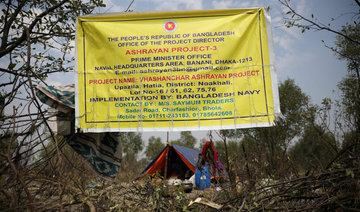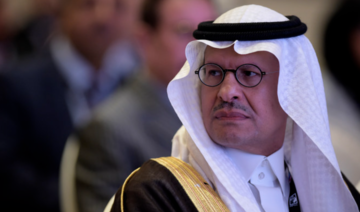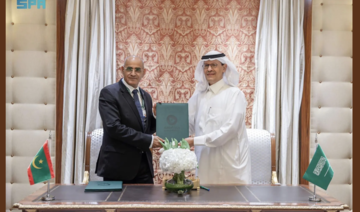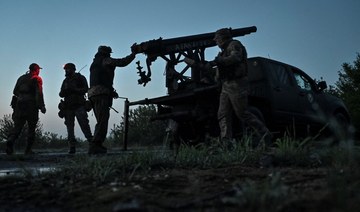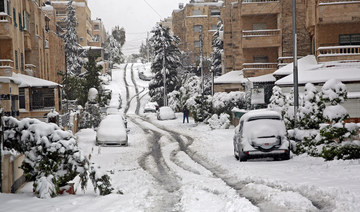BANGKOK: First, their villages were burned to the ground. Now, Myanmar’s government is using bulldozers to literally erase them from the earth — in a vast operation rights groups say is destroying crucial evidence of mass atrocities against the nation’s ethnic Rohingya Muslim minority.
Satellite images of Myanmar’s troubled Rakhine state, released to The Associated Press by Colorado-based DigitalGlobe on Friday, show that dozens of empty villages and hamlets have been completely leveled by authorities in recent weeks — far more than previously reported. The villages were all set ablaze in the wake of violence last August, when a brutal clearance operation by security forces drove hundreds of thousands of Rohingya into exile in Bangladesh.
While Myanmar’s government claims it’s simply trying to rebuild a devastated region, the operation has raised deep concern among human rights advocates, who say the government is destroying what amounts to scores of crime scenes before any credible investigation takes place. The operation has also horrified the Rohingya, who believe the government is intentionally eviscerating the dwindling remnants of their culture to make it nearly impossible for them to return.
One displaced Rohingya woman, whose village was among those razed, said she recently visited her former home in Myin Hlut and was shocked by what she saw. Most houses had been torched last year, but now, “everything is gone, not even the trees are left,” the woman, named Zubairia, told AP by telephone. “They just bulldozed everything ... I could hardly recognize it.”
The 18-year-old said other homes in the same area that had been abandoned but not damaged were also flattened. “All the memories that I had there are gone,” she said. “They’ve been erased.”
Myanmar’s armed forces are accused not just of burning Muslim villages with the help of Buddhist mobs, but of carrying out massacres, rapes and widespread looting. The latest crisis in Rakhine state began in August after Rohingya insurgents launched a series of unprecedented attacks on security posts.
Aerial photographs of leveled villages in northern Rakhine State were first made public Feb. 9 when the European Union’s ambassador to Myanmar, Kristian Schmidt, posted images taken from an aircraft of what he described as a “vast bulldozed area” south of the town of Maungdaw.
Satellite imagery from DigitalGlobe indicates at least 28 villages or hamlets were leveled by bulldozers and other machinery in a 30-mile (50-kilometer) radius around Maungdaw between December and February; on some of the cleared areas, construction crews had erected new buildings or housing structures and helipads. A similar analysis by Human Rights Watch on Friday said at least 55 villages have been affected so far.
The images offer an important window into what is effectively a part of Myanmar that is largely sealed off to the outside world. Myanmar bars independent media access to the state.
The government has spoken of plans to rebuild the region for months, and it has been busily expanding roads, repairing bridges, and constructing shelters, including dozens at a large transit camp at Taungpyo, near the Bangladesh border. The camp opened in January to house returning refugees; but none have arrived and Rohingya have continued to flee.
Myint Khine, a government administrator in Maungdaw, said some of the new homes were intended for Muslims. But that does not appear to be the case for the majority of those built or planned so far, and many Rohingya fear authorities are seizing land they’ve lived on for generations.
One list, published by the government in December, indicated 787 houses would be constructed, most of them for Buddhists or Hindus. Only 22 of the houses were slated for “Bengalis” — the word Myanmar nationalists often use to describe the Rohingya, who they say are illegal migrants from Bangladesh.
Myint Khine said the government had no ulterior motive.
“Of course we have been using machines like earth removers and bulldozers because we have to clear the ground first before building new houses,” he said.
Chris Lewa, whose Arakan Project monitors the persecuted Muslim minority’s plight, said the degree to which the villages had been razed would make it even harder for the Rohingya, who have no citizenship and few rights, to ever reclaim their land.
“How will they identify where they lived, if nothing is left, if nothing can be recognized?” Lewa said. “Their culture, their history, their past, their present — it’s all being erased. When you see the pictures, it’s clear that whatever was left — the mosques, the cemeteries, the homes — they’re gone.”
Richard Weir, a Myanmar expert with Human Rights Watch, said on the images he had seen, “there’s no more landmarks, there’s no trees, there’s no vegetation.”
“Everything is wiped away, and this is very concerning, because these are crime scenes,” he said. “There’s been no credible investigation of these crimes. And so, what we’re talking about really is obstruction of justice.”
Both Weir and Lewa said no mass graves were known to have been destroyed. But, Weir added: “We don’t know where all the graves are ... because there is no access.”
Zubairia, who asked that only one of her names be used to protect her identify because she feared reprisals, said she did not believe any of the newly constructed homes were intended for Rohingya.
“Even if they give us small houses to live in, it will never be the same for us,” she said. “How can we be happy about our houses being ripped off from our land?“
Myanmar bulldozes what is left of Rohingya Muslim villages
Myanmar bulldozes what is left of Rohingya Muslim villages
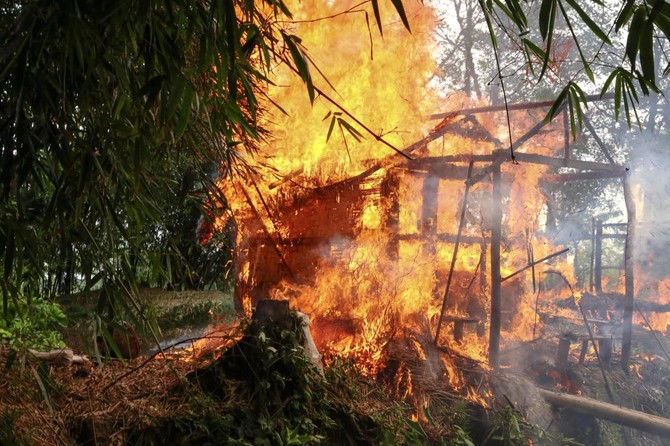
Germany failing to protect Muslims from hate: Human Rights Watch
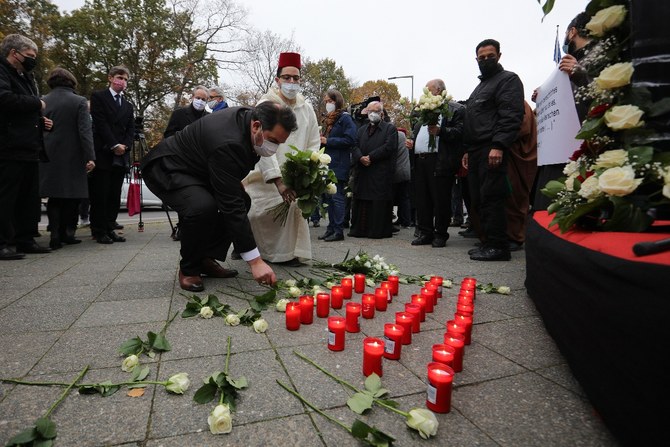
- Government ‘lacks understanding’ of racism targeting Muslim communities
- 2023 marked ‘frighteningly new high’ for hate incidents: German NGO chief
LONDON:Germany is failing to protect Muslims from growing racism amid a “lack of understanding” about the issue, Human Rights Watch has warned.
The country has yet to implement a working definition of anti-Muslim racism and frequently fails to record data on race-hate incidents, the organization said on Tuesday.
A key failing of the German government concerns its “lack of understanding that Muslims experience racism and not simply faith-based hostility,” said Almaz Teffera, a HRW researcher on racism in Europe.
“Without a clear understanding of anti-Muslim hate and discrimination in Germany, and strong data on incidents and community outreach, a response by the German authorities will be ineffective.”
Germany recorded 610 “anti-Islamic” crimes in 2022, but from the start of 2023 to September that year, the number had climbed to 686.
There are fears that the figure has further surged since the outbreak of the Gaza conflict last October.
Germany’s Interior Ministry told HRW that it could not provide data on anti-Muslim crimes from October 2023 to the year-end.
However, civil society groups in the country recorded a spike in reported incidents, leading Germany’s federal commissioner for anti-racism, Reem Alabali-Radovan, to join an EU-wide expression of concern about the rise in hate.
The Alliance Against Islamophobia and Anti-Muslim Hate, a German NGO network, documented “an average of three anti-Muslim incidents a day” last November.
The network’s chief, Rima Hanano, told HRW that “2023 marked a frighteningly new high for anti-Muslim incidents.”
Though the network collects its own internal data on the frequency of hate incidents, the German government “has yet to develop an infrastructure for countrywide monitoring and data collection,” HRW said.
The government has also classified hate incidents against Muslims as “anti-Islamic” since 2017, removing nuances surrounding the ethnic identities of victims, HRW added.
A three-year study commissioned by the government and published last year recommended that authorities “no longer dissociate anti-Muslim hate from racism,” but instead “recognize their connection.”
However, the Interior Ministry has failed to carry out the report’s recommendations, HRW said, adding: “Any focus on anti-Muslim hate and discrimination that fails to include racism or acknowledge the intersectional nature of such hostility will be unable to capture the full picture or inform effective policy responses.”
Muslim communities in Germany are a “group with a diversity of ethnicities” rather than a “monolithic religious group,” said Teffera.
“Germany should invest in protecting Muslims and all other minority communities in Germany because it is an investment in protecting all of German society.”
A gunman kills 6 worshippers inside a Shiite mosque in western Afghanistan, the Taliban say
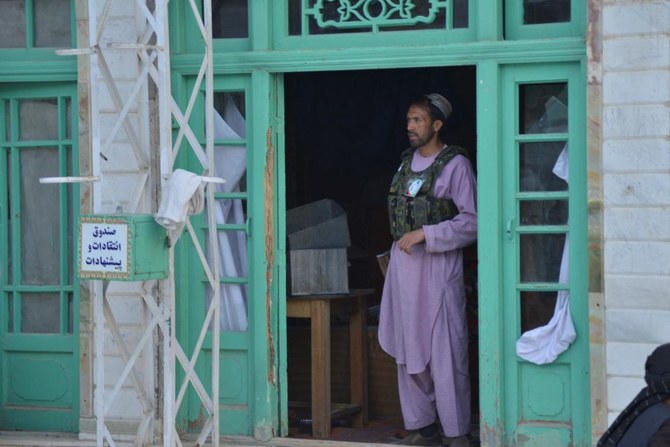
ISLAMABAD: A gunman stormed a mosque in western Afghanistan, opening fire and killing six people as they were praying, a Taliban official said Tuesday.
Local media reports and a former president of Afghanistan said the mosque was targeted because it was a place of worship for the country’s Shiite Muslim minority.
The attack happened on Monday night in the district of Guzara in Herat province, said Abdul Mateen Qani, a spokesman for the Taliban Interior Ministry. He said in a post on the social media platform X that an investigation was underway.
No one immediately claimed responsibility for the attack, which also wounded another worshipper while the attacker fled. Local media reported that the mosque's imam was among those killed.
“I strongly condemn the attack on the Imam Zaman Mosque,” former Afghan President Hamid Karzai said on X. “I consider this terrorist act against all religious and human standards.”
The United Nation Assistance Mission in Afghanistan also condemned the attack, which it said killed and wounded at least seven people, including a child. It called for urgent accountability for perpetrators and protection measures for Shitte communities.
The Islamic State group’s affiliate in Afghanistan is a major Taliban rival and frequently targets schools, hospitals, mosques and Shiite areas throughout the country.
The Taliban seized power in Afghanistan in August 2021, during the last weeks of the chaotic departure of U.S. and NATO troops from the country after 20 years of war.
Despite initial promises of a more moderate stance, the Taliban gradually reimposed a harsh interpretation of Islamic law, or Shariah, as they did during their previous rule of Afghanistan from 1996 to 2001.
Russia says United States is being hypocritical over ICC and Israel
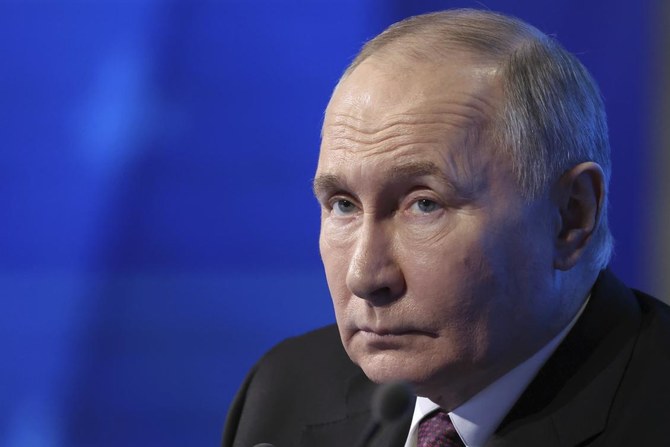
- US President Joe Biden said last year that the ICC decision to issue an arrest warrant for Putin was justified
MOSCOW: Russia said on Tuesday that the United States was being hypocritical by opposing the International Criminal Court’s (ICC) investigation of Israel but supporting the court’s warrant for the arrest of President Vladimir Putin.
The ICC — which can charge individuals with war crimes, crimes against humanity and genocide — is investigating Hamas’ Oct. 7 cross-border attack and Israel’s devastating military assault on Hamas-ruled Gaza, now in its seventh month.
White House spokesperson Karine Jean-Pierre said on Monday the United States did not support the ICC’s investigation of Israel and did not believe that the court had jurisdiction.
US President Joe Biden said last year that the ICC decision to issue an arrest warrant for Putin was justified. The United States has shared details of alleged Russian war crimes in Ukraine with the ICC.
Russia says the warrant against Putin is a meaningless attempt by the West to soil Russia’s reputation and denies war crimes in Ukraine. Ukraine says Russia committed war crimes. Russia says the West has ignored Ukraine’s crimes, a charge denied by Kyiv.
“Washington fully supported, if not stimulated, the issuance of ICC warrants against the Russian leadership,” Russian Foreign Ministry spokesperson Maria Zakharova said in a post on Telegram.
But “the American political system does not recognize the legitimacy of this structure in relation to itself and its satellites,” Zakharova said, adding that such a position was intellectually “absurd.”
The Kremlin has called the issuing of the warrant against Putin outrageous and legally void, as Russia is not a signatory to the treaty that created the ICC.
Israel is not a member of the ICC, while the Palestinian territories were admitted as a member state in 2015.
Prime Minister Benjamin Netanyahu said on Friday that any ICC decisions would not affect Israel’s actions but would set a dangerous precedent.
Israeli officials are worried that the court could issue arrest warrants against Netanyahu and other top officials for alleged violations of international humanitarian law in Gaza, Israeli media have reported.
They said the ICC is also considering arrest warrants for leaders from Hamas.
London police arrest sword-wielding man after reports of stabbing
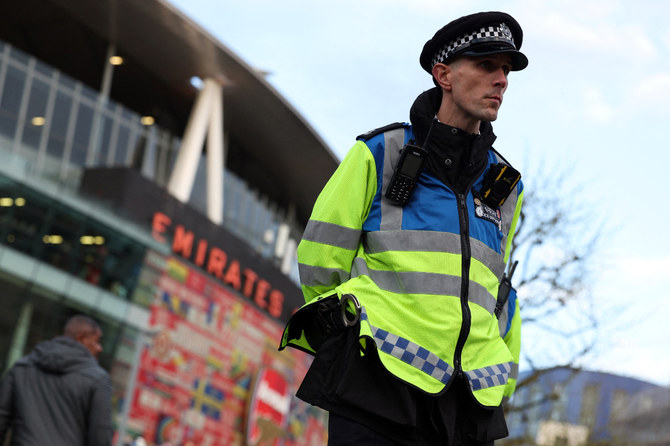
- Police said the suspect had attacked members of the public and two officers
LONDON: British police have arrested a man armed with a sword following reports of people having been stabbed during a serious incident in northeast London although it was not thought to be terrorism-related, the capital’s police force said on Tuesday.
The 36-year old man was arrested after police were called to reports of a vehicle being driven into a house in the area close to Hainault train station, the Metropolitan Police said in a statement.
Police said the suspect had attacked members of the public and two officers.
“This must have been a terrifying incident for those concerned. I know the wider community will be feeling shock and alarm,” Metropolitan Police Deputy Assistant Commissioner Ade Adelekan said. “We do not believe there is any ongoing threat to the wider community.”
The force said the incident did not appear to be terror-related and they were not looking for further suspects.
“I am being regularly updated about the incident at Hainault Station this morning,” Britain’s interior minister James Cleverly said on X. “My thoughts are with those who have been affected.”
Gunman kills six in attack on Afghan mosque – Taliban spokesman
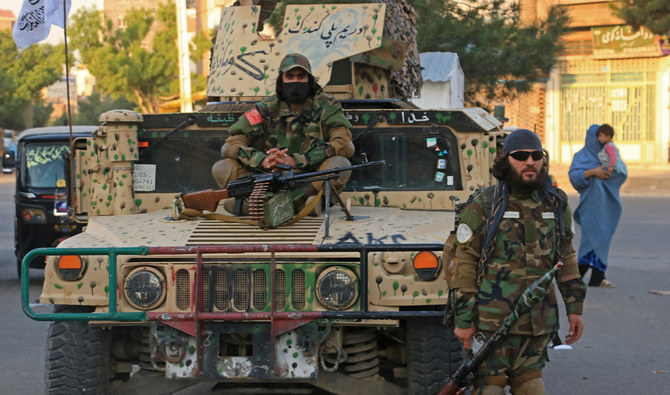
- Locals say the mosque served the minority Shiite community just south of the Afghan city of Herat
- While no group has claimed the attack, the regional chapter of Daesh is viewed as threat in Afghanistan
HERAT: A gunman stormed a mosque in western Afghanistan and killed six people, a government spokesman said Tuesday, with local residents claiming the minority Shiite community had been targeted.
Interior ministry spokesman Abdul Mateen Qani said that “an unknown armed person shot at civilian worshippers in a mosque” in Herat province’s Guzara district on Monday at around 9:00 p.m. (1630 GMT).
“Six civilians were martyred and one civilian was injured,” he wrote on social media platform X early Tuesday morning.
Locals said the mosque served the minority Shiite community in a district just south of the provincial capital of Herat city, and the imam and a three-year-old child were among those killed.
They also said a team of three gunmen staged the attack, contradicting the official account.
“One of them was outside and two of them came inside the mosque, shooting the worshippers,” said 60-year-old Ibrahim Akhlaqi, the brother of the slain imam. “It was in the middle of the prayers.”
“Whoever was in the mosque has either been martyred or wounded,” added 23-year-old Sayed Murtaza Hussaini.
While no group has claimed the attack, the regional chapter of Daesh is the largest security threat in Afghanistan and has frequently targeted Shiite communities.
The Taliban government has pledged to protect religious and ethnic minorities since returning to power in August 2021, but rights monitors say they’ve done little to make good on that promise.
The most notorious attack linked to Daesh since the Taliban takeover was in 2022, when at least 53 people — including 46 girls and young women — were slain in the suicide bombing of an education center.
Taliban officials blamed Daesh for the attack, which happened in a Shiite neighborhood of the capital Kabul.
Afghanistan’s new rulers claim to have ousted Daesh from the country and are highly sensitive to suggestions the group has found safe haven there since the withdrawal of foreign forces.
Taliban authorities have frequently given death tolls lower than other sources after bombings and gun attacks, or otherwise downplayed them, in an apparent attempt to minimize security threats.
A United Nations Security Council report released in January said there had been a decrease in Daesh attacks in Afghanistan because of “counter-terrorism efforts by the Taliban.”
But the report said Daesh still had “substantial” recruitment in the country and that the militant group had “the ability to project a threat into the region and beyond.”
Daesh chapter spanning Afghanistan, Pakistan and Central Asia claimed responsibility for the March attack on the Crocus City Hall concert venue in Moscow, killing more than 140 people.
It was the deadliest attack in Russia in two decades.


